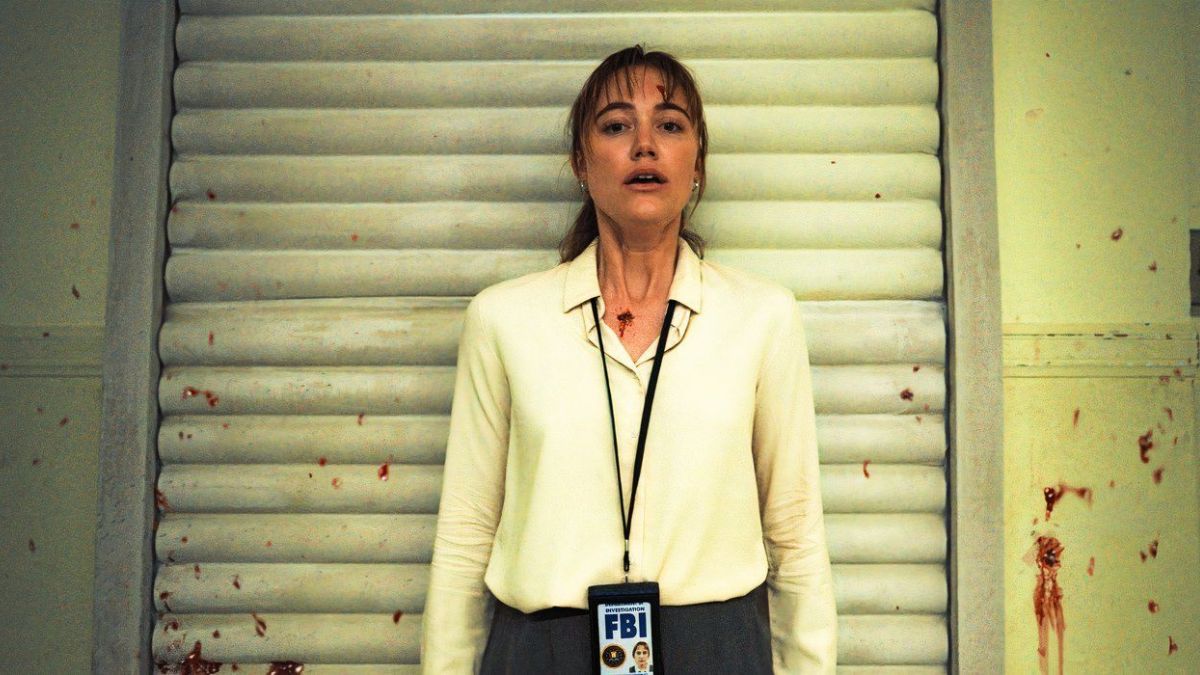Osgood “Oz” Perkins is already a beloved horror filmmaker. Yet, Longlegs has the potential to finally take him mainstream, all thanks to Nicolas Cage’s star power and a viral marketing campaign. So, it’s great to confirm audiences are getting precisely what they want: an unnerving movie that lingers in the darkest corners of the mind long after the credits roll.
Longlegs follows Maika Monroe as Lee Harper, an FBI agent fresh out of the academy dragged into the decade-long investigation of an impossible killing spree. Over the years, devoted Christian men have suddenly snapped, murdering their wives and two children before taking their own lives. What makes things weird is that the police found encoded letters at each crime scene, all signed by “Longlegs.”
As if a serial killer being the cause of multiple murder-suicides wasn’t strange enough, Longlegs also explores the unlikely connection between Special Agent Harper and the titular criminal, portrayed by Cage. Plus, Harper’s seemingly supernatural intuition allows her to find clues where no other agent could. There’s something spooky going on, and each scene of Longlegs offers new pieces of the puzzle.
Set in the early 1990s, Longlegs feels like an homage to psychological thrillers that still capture the twisted imagination of horror lovers, like David Fincher’s Seen and Jonathan Demme’s The Silence of the Lambs. Other Fincher works, such as Zodiac, could also be cited as sources of inspiration, as Perkins’ Longlegs has some obvious parallels with the real-life Zodiac Killer. These influences feed into Longlegs‘ eerie and dangerous world, testing both Harper’s and the audience’s sanity while slowly unraveling its titular antagonist’s twisted crimes.
The bright white and pronounced shadows help build the movie’s intense atmosphere, as the contrast serves to hide threats in the corner of the frame and highlight the anguish of Harper as she learns more about the brutal methods of Cage’s Longlegs. In addition, the analog film texture gives a gritty feel that makes it feel even more real. Finally, the brilliant soundtrack knows when to use silence, allowing viewers to be involved in the disquieting pounding of heartbeats or undistinguishable shrills that your mind can’t quite comprehend.
Every aspect of Longlegs is meticulously crafted to give the movie its nightmarish aura. The result is mesmerizing, you cannot look away, even when fully aware of how unease Perkin’s latest makes you feel.
It wouldn’t be right to say Longlegs is scary. It’s not fear it inflicts on the audience. It’s dread. The kind of dread that quietly burrows into the skin so slowly that you only notice it when it has spread its roots and taken over your body. You can dismiss a scary movie when the theater lights turn on, and you realize the horrors on the silver screen were make-believe. In its turn, Longlegs latches into your subconscious, forcing you to carry home the terrible seeds it has planted.

One thing that separates Longlegs from other serial killer stories is how the movie is willing to flirt with the supernatural. From the start, it raises questions about Harper’s abilities and the killer’s incredible influence over people. For most of the runtime, Perkin’s script masterfully plays with the mystery, forcing the audience to question what they know and wonder what connects all the seemingly unrelated events surrounding Harper’s investigation.
For better or worse, this is not an abstract story, and Perkins will explain everything in the Longlegs’ third arc. The answers are not quite satisfying, though.
First, the twists and turns of Longlegs are sufficiently telegraphed so that people can predict what happens next. Horror fiends, in particular, shouldn’t have much trouble anticipating where Longlegs is taking them. However, Perkins still chews things up for the viewer, afraid that someone might otherwise miss the truth. This choice briefly breaks the spell, as the unnecessary exposition connects the loose threads of the movie. Things improve in the final scenes. Still, it’s a shame Perkins didn’t trust his ability to use subtlety as a tool.
Nevertheless, the journey is still satisfying enough for people to forgive what is bound to be a divisive destination. Over his prolific career, Perkins has proved he has a talent for exploring the psychological particularities of broken minds. That has been his main interest since 2015’s The Blackcoat’s Daughter, another movie about gruesome actions and the beliefs that push killers to pursue victims. Longlegs feels like the culmination of the filmmaker’s work. He applies everything he has learned since then to deliver a beautifully shot movie that features one of the most fascinating and memorable serial killers ever to grace a theater with its presence.

Perkins’ impeccable directing skills are complemented by a handful of great performances in the making of Longlegs. Harper is Monroe’s most engaging character to date, and she shows she’s up to the challenge of playing a woman who’s equally fierce and terrified, doubting what her eyes witness while still daring to take the next step. She often interacts with the always great Blair Underwood as Agent Carter, her veteran FBI superior who pushes the boundaries of logic to keep following the mysterious. Unsurprisingly, though, the star is Cage’s deranged killer.
Cage’s nouveau shamanic acting has given birth to many unique characters over his successful career. His exaggerated expressions and trance-like commitment to each part often lead to unpredictable performances that are equally loved and hated. Despite that, one could argue Cage is at home when involved in horror projects. In the past decade, his presence has elevated dozens of movies, including Mandy, Wily’s Wonderland, Color Out of Space, and the recent alien-hunting Arcadian. His exaggerated expression fit perfectly with the bloody and chaos the horror genre is known for. This begs the question: why hasn’t anyone tried turning Cage into a serial killer?
Cage’s Longlegs is a masterpiece. He is a terrifying lunatic whose unpredictability only makes him more dangerous. Longlegs is, without question, Cage’s most harrowing role to date. You never know what will happen when he enters the scene, and Longlegs’ marketing campaign should be praised for the inspired decision to reveal the least as they could of Cage’s character. As a result, each scene featuring Cage hits harder, and we, the audience, get bewitched by the actor’s powers just as the killer entrances his victims.
Longlegs is far from perfect, with a third arc that damages the movie’s pacing. Still, helped by a fantastic cast, Perkins has built something unique. There are plenty of reasons to watch it in theaters. While your mileage might vary depending on how you allow yourself to flow in Perkins’ stream of enthralling imagery, it’s impossible to experience Longlegs and be indifferent.

